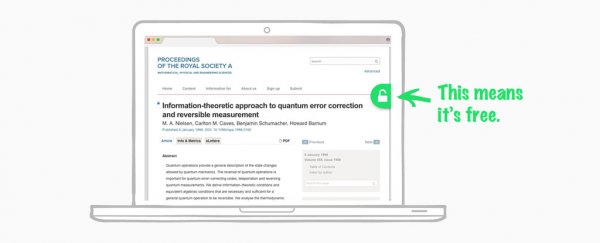A perfect storm of technology and the public's demand for knowledge are driving a surge towards open access (OA) science and academia that anyone can read for free.
Now, the researchers behind Unpaywall – a browser plug-in that helps you find free, legal copies of academic papers – have conducted a huge analysis of the state of OA literature, and it confirms that the barriers to scientific knowledge are truly crumbling.
The team used three separate sampling methods to analyse the state of access to 300,000 random journal articles available online, and estimate that a stunning 28 percent of all scholarly literature – some 19 million articles, basically everything with a DOI dating as far back as 1900 – is now open access.
More importantly, they say "a sea change is imminent" in OA, as the trend towards making journal papers freely available gathers momentum – overturning the tradition of keeping publicly-funded research locked behind commercial publishers' paywalls.
For the most recent year analysed – articles published in 2015 – the researchers found that almost half (45 percent) of all academic papers were freely available to the public.
In addition, because people are more likely to want to read newer and current research than older literature, it's becoming more likely that we'll stumble upon free research and won't hit a paywall.
In fact, users of the Unpaywall browser extension encountered OA research in 47 percent of the articles they view – a figure that's getting awfully close to a hugely symbolic threshold.
The research is currently undergoing peer review, which is something we should bear in mind, and consider these as only preliminary findings for now.
But if the trend towards OA keeps pace, the researchers envisage a future where potentially all scientific and academic knowledge is freely accessible for the benefit of all – an ideal that others are also trying to realise, whether by legal means or emphatically otherwise.
"The business model of, 'I've got something you want, and I won't let you look at it unless you pay me money,' is a very old business model," one of the team, Jason Priem from non-profit Impactstory told The Scientist.
"It's been going on for quite a long time. I suspect there will be people who continue to find a way to make money off of that. That said, I think that's going to be such a tiny minority, simply because research funders are getting tired of funding research that's needlessly hidden behind a pay wall."
Of course, it's impossible to discuss the state of today's open access landscape without bringing up the massive elephant in the room – Sci-Hub, the controversial site that lets you illegally access millions of scientific papers.
Unlike tools such as Unpaywall – which helps you identify free, legally available copies of studies – Sci-Hub occupies far murkier territory, and has been dubbed "the Pirate Bay of science", even while others applaud that it's tearing down barriers to knowledge.
It's an uneasy dichotomy that the Unpaywall team are only too keenly aware of.
"One thing that I really like about Sci-Hub is it highlights for people both the unfortunate state of affairs right now, where you have to resort to using a pirate site to read papers, and it also shows people what the future could look like – a future where all papers are just universally open-access, and how powerful that could be," Priem explained to Bob Grant at The Scientist.
"On the other hand, a really big problem with Sci-Hub is that – at least based on the interpretation of the law that I have read – it's not legal. It's a pirate site. And, consequently, I think there are very serious question marks about its long-term sustainability."
Things are moving pretty fast in this area – Unpaywall only launched in April this year, after all – and it's likely we'll see a lot more change coming in the near future.
While that's happening and the debate wages on, whichever ways you choose to access research, it's good to know that science and academia are more accessible than ever to humanity – with untold worlds of knowledge resting at the tips of our fingers.
The findings are reported in PeerJ Preprints.
